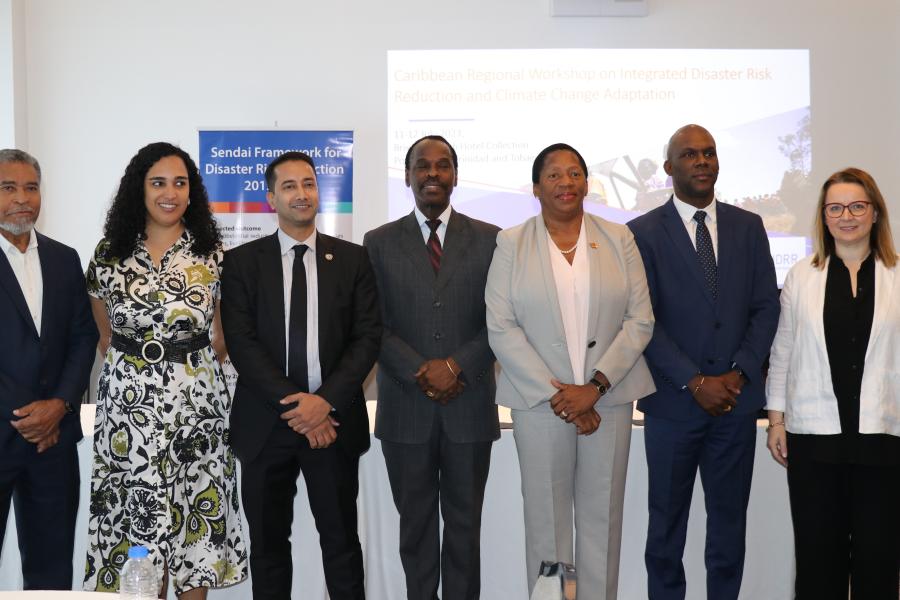RC: "Disaster Preparedness Crucial for Sustainable Development"

𝐑𝐂 𝐉𝐨𝐚𝐧𝐧𝐚 𝐊𝐚𝐳𝐚𝐧𝐚 𝐬𝐚𝐲𝐬 𝐃𝐢𝐬𝐚𝐬𝐭𝐞𝐫 𝐑𝐢𝐬𝐤 𝐑𝐞𝐝𝐮𝐜𝐭𝐢𝐨𝐧 𝐢𝐬 𝐜𝐫𝐢𝐭𝐢𝐜𝐚𝐥 𝐭𝐨 𝐚𝐜𝐡𝐢𝐞𝐯𝐢𝐧𝐠 𝐭𝐡𝐞 𝐒𝐃𝐆𝐬
UN Resident Coordinator, Ms. Joanna Kazana, delivered a keynote address at the Caribbean Regional Workshop on Integrated Disaster Risk Reduction and Climate Change Adaptation.
The workshop was jointly hosted by CDEMA, the Caribbean Community Climate Change Centre, the United Nations Framework Convention on Climate Change and the United Nations Office of Disaster Risk Reduction.
Participants from 18 CARICOM Member States are attending the two day workshop from July 11 to 12 in Port of Spain.
The following are RC Kazana's remarks:
"Good morning, Ladies and Gentlemen.
It is my great pleasure to welcome you today and address this meeting on behalf of the United Nations system and all UN agencies working in Port of Spain.
I would like to thank the Government of TT for your support and leadership on the issue of Sustainable Development, climate change adaptation, mitigation and disaster risk reduction.
The Caribbean is a microcosm of vulnerability and most countries have seen it all.
Volcanic eruptions, hurricanes, earthquakes, floods, oil spills, and a crippling pandemic of Covid-19.
There is no need to persuade anyone anymore that there is a price we are all paying if lives are lost, properties damaged, economies suffer severe setbacks.

At policy and decision making level, there is no more doubt that Disaster Preparedness, Risk Reduction and Climate Change Adaptation are crucial for sustainable development.
Over the last decade, a number of countries in the Caribbean region have worked on their National Climate Change Adaptation Plans. Here in TT, a First Draft has been prepared by the Ministry of Planning and Development and we look forward to supporting a broad national consultation to build cross-sectoral understanding and strong synergies between the NAP, the National Strategy for Disaster Risk Reduction and the country’s National Development Strategy “Vision 2030”.
Why is planning important and why streamlining of the national climate change adaptation strategy and national disaster risk reduction plans are needed?
Again, the answer is simple – a good national plan is an important tool that can be used to manage its cross-sectoral implementation, to allocate resources where they are needed and to attract external investments in sustainable infrastructure, services, new technologies of the future.
In addition to such country level efforts, in 2022 the UN Secretary-General Antonio Guterres announced a 3.1 billion dollar Early Warnings For All Initiative to ensure that every person is protected by an early warning system within the next five years, until 2027.
The UN Office for DRR – one of the organisers of the workshop today, is at the forefront of this global project and the Caribbean is one of the first regions to implement the initiative.

Ladies and Gentlemen,
The challenges we are facing today can be addressed only through stronger international cooperation.
Developed countries must finally make good on their financial commitments to developing countries – including by doubling adaptation finance, operationalizing the loss and damage fund, and replenishing the Green Climate Fund.
As part of global preparation for the Summit of the Future in 2024, the UN SG put forward a detailed blueprint for a re-designed global financial architecture.
Obviously change will not happen overnight and there are many challenges draining coffers of our international donors.
But Caribbean leaders have been pointing the way forward – including through the Bridgetown Initiative and through the Finance for Development initiative.
So partnerships are key, but so is data, transparency and information management systems.
As you spend the next two days exchanging information and experiences to better support national disaster risk reduction plans, I encourage you to keep these considerations in mind.
The UN system stands ready to continue supporting Governments, civil society and private sector actors in translating these priorities and plans into partnerships and viable investment opportunities.
You can feel confident in our unwavering support to ensure that together, we Leave No One Behind.




